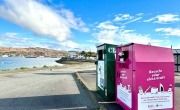Defra calls for wood waste policy ideas

The Department for Environment, Food and Rural Affairs (Defra) opened a consultation calling for ideas and evidence on how best to manage wood waste in England yesterday (31 July).
Running until 28 September, the “Call for Evidence” from Defra’s Landfill Restriction Team, invites stakeholders to email or write in their views on best practice for sustainable management of wood waste and measures to divert the 1.2 million tonnes of wood waste sent to landfill in the UK each year ‘to the most appropriate use’. The consultation is part of the government’s intentions to restrict the landfilling of wood waste in new policy as outlined in the Waste Policy Review 2011.
Responses received will be used to help develop policy options aimed at ensuring wood waste is managed in a way that ‘delivers the best outcome for the economy and the environment’. Though Defra expects wood waste sent to landfill to drop to 300,000 tonnes by 2024 (due to increases in landfill tax and subsidies for renewable energy generation), they believe that ‘new policy interventions’ will be needed to further drive wood waste from landfill.
Dave Lee, Group Operations Director at Hadfield Wood Recyclers welcomed the consultation on new wood waste policy, but warned that certain areas need to be looked at very carefully in order for the ban to be successful. “In principle the idea of a ban on waste wood going to landfill is a good one and Hadfield Wood Recyclers fully support the concept. However, for a ban to work effectively a number of factors would have to be addressed.
“Firstly, the issue of wood that can’t be segregated from other materials, such as sofas, would need to be addressed. If this material can’t go to landfill and it isn’t suitable for panel board or dedicated biomass, then Energy from Waste facilities are the likely home for the material. Lack of capacity for these facilities is a current topic of much debate and this would need to be addressed to make a landfill ban work.
“Secondly, if best use of the commodity is to be made there would need to be an increase in outlets for easily segregated waste wood, such as biomass plants and panel board facilities, in order to absorb excess material. These facilities could be located outside the UK, but as current South-East market conditions show, export off take has a habit of being highly seasonal and unreliable. A sustainable marketplace really requires the establishment of geographically distributed consumption of wood waste within the UK, better aligned to the population density profile.
“Finally, the timing and implementation process for a ban would be critical. A ban - while good in principle - would bring challenges at this time in particular, with material stocks high across the industry. We would therefore urge the introduction of any ban to be well planned and to ensure that the measures are in place to address the issues that will undoubtedly arise if a ban is introduced”, warned Lee.
Specific issues that could be included in the evidence are:
- Practicalities of sorting wood waste and establishing grading quality
- Lead times for introducing a landfill ban
- Practical enforcement of any restriction
- Improved collection and sorting infrastructure
- Producer responsibility schemes
- Increasing re-use of wood waste.
- Evidence for the 'do nothing' option
The consultation comes just days after the UK’s largest wood recycler, Sonae Industria announced that its Knowsley chipboard plant is in consultation and could potentially close due to delays to planning permission and a struggling economy.
Further information on the consultation, including data on wood waste and addresses to send evidence to, is available from Defra’s website.





